You should never meet your heroes, right? Except sometimes your heroes turn out to be even cooler than their on-stage demeanour might suggest. Spend time talking to Monster Magnet frontman Dave Wyndorf, for example, and you’ll discover a musician still in thrall to the magic of music. As likely to talk to you about the grandeur of the big record sleeves of the seventies or the amazing music that influenced him, as he is to talk about his own amazing music, Dave lives for music and his passion and enthusiasm is infectious. For anyone who’s not encountered the monolithic entity that is Monster Magnet, Dave Wyndorf and his merry band have travelled the world, spreading the new psychedelic gospel for some twenty-five years. In that time they’ve delved into high-octane rock (‘powertrip’) evil stoner (‘superjudge’, ‘dopes to infinity’) and crazed blasts of tripped-out psychedelic rock (‘milking the stars’ ‘four way diablo’), frequently reinventing themselves and donning some eye-wateringly tight leather pants in the process. They’ve blitzed stages (infamously igniting the second stage at 1999’s Big Day Out festival in Milton Keynes) and covered David Gilmour songs and throughout it all they’ve remained true underground legends.
With that in mind it is with some trepidation that the hour of our interview approaches, but I needn’t have worried. Funny, courteous and full of stories, Dave Wyndorf took a good deal of time to discuss in depth the creation of ‘Milking the stars’, the stunning reinvention of a record that was already damned good (last year’s ‘last patrol’). Covering a good deal of ground, this interview was nothing less than an absolute pleasure to conduct and I hope you’ll get as much out of reading the transcript as I did out of having the opportunity of talking to one of rock’s most consistently passionate and entertaining artists.
Milking the stars is kind of a rare concept – to re-record an album so recently released – what was the motivation behind it all?
Yeah, it’s kind of silly, right, like “what are you doing?” right? Really, the motivation was experiment. It was just having the notion to experiment with material where I just knew where everything was. It’s not a new notion with me. I always wonder and realise that music is… songs are very malleable, after a certain… if you add a different note or instrument it changes the nature of the song somewhat and I love to play in the studio. So this time, while I was just about finished with ‘last patrol’ and I had tours booked it was in the back of my mind that it would be nice to do. So I went out on tour and thought about it, and I figured that I make these records now very close to my home, so I could just go in and see what would happen. So it’s basically a guy, riding around in a bus going “Oh man, I should’ve put a sitar on this song!” Very juvenile but you know – “It would be really cool if I put an organ on this!” or “wouldn’t it be cool if it sounded like this was made in the 1960s?!” So I just did it. I was like ‘fuck it! I’ll just go back and try it.” So I did, and it was so much fun that we finished it. And about half way through when it was done I rang up the record company and asked if they wanted to put it out because I thought it was really cool.
It was just you and Phil wasn’t it?
Yeah, it wasn’t a whole “let’s drag the whole band in” kinda thing because we didn’t have time to do that and it probably wouldn’t be worth it to do that. Part of the experiment was to see what I could get away with, with pre-existing material, mainly drums, and originally I hadn’t thought to re-track too much stuff, but as we got into it, it was just too much fun so we took a lot of the old guitars out and replaced them with a different guitar, keyboards and I chopped up drums, you know digitally went in there and re-arranged drum patterns. Just to suit whatever the concept of the song was and it was really fun… it was really fun to do.
It really surprises me to hear you talk about chopping up drums because listening to the record it sounds so spontaneous and drawn out in a way you’d expect from a band jamming in the studio together…
Yeah, that’s part of the thing. Like, doing the right kind of chopping. It was always in my mind that it couldn’t sound chopped, you know what I mean, this is not what people usually do to chopped drums which is “duh duh duh – hey look I chopped up some drums!” This was like painstaking like “no, it doesn’t sound real enough, I need a fill… I need a sloppy fill… I need a fill that’s off-time.” So we’d spend hours going through to the tag ends of songs and find fills that were different and some that weren’t completely on time and then we laid that and I played like a scratch guitar over the top of it in a lazy fashion to really kinda recreate what would go live… how I’d play live which is probably more down to reacting to the excitement of the track than keeping in strict time. So things speed up a little and sometimes guitar comes in a little too early and it’s all that stuff that actually makes it sound live and it’s cool. And also to make sure to record with… most of the fx you hear on there are recorded to tape… or hard drive or whatever you want to call it… the fx are printed, they’re part of the guitar signal and that also makes it sound very real.
It’s such a cool album – the way that some of the songs that stretch out and expand particularly the opening track – and I’ve just got this image of you sitting in the studio just getting lost in the songs…
Oh yeah! Totally! Totally lost, because what I did was ask Phil to get a drum loop – a loop of the tribal drum sound on ‘last patrol’ and I wanted that for six minutes – straight through, no altering, just that looped for six minutes. And then I just sat there with a guitar and played, pretty much off the top of my head, patterns that felt good, and then stopped and then restarted, to give holes in the song. So it was made up pretty much on the spot with a scratch guitar and then I sat back and listened to that and said “OK! I’ll add to it – it’s a pretty good arrangement even though it was made up on the spot so we can shorten it here digitally…” and then I put an organ over the top and another guitar and then the bass and… it sounded good! So we did it by feel and it really does sound like a bunch of guys sitting in a studio which is cool.
It never occurred to me when I first heard Monster Magnet – when I first heard you guys you were doing ‘Powertrip’ and I dug the long songs but mainly I was along for the riffs – but then you did ‘monolithic baby’ and you put on this David Gilmour cover and I finally got that whole Pink Floyd connection in what you’re doing… but ‘Milking the stars’… dude, it was like the first time I heard ‘saucerful of secrets’….
Oh man, thank you, there’s a whole lot of Floyd in there there’s all that Mellotron flute and stuff and… Pink Floyd was huge for me when I was a kid. I remember listening to ‘Ummagumma’ and the live section of that and I just couldn’t believe that four guys were making all this stuff
That took me a while to get because someone played me the studio disc first…
Oh man… it’s like ‘what is this?!’ and run screaming for the door! I love the studio disc, it’s nice and stuff, but the live disc… that collection of live songs… I don’t know that they ever played that collection of songs better than that album, it’s just amazing.
And that’s what I felt when I first hear ‘Milking the stars’ because it’s powerful but it feels a little unhinged too, like it could go off the rails at any time, and that goes back to my first question because it feels very live.
Well thanks man – I’m so glad you noticed that because that’s exactly what I was going for. You make judgement calls and you know that it’s off and it’s like yeah, it’s off, but it also sounds fucking cool! One person’s off is another person’s cool and it’s good to always think that way.
Another thing that ties this record back to those big progressive bands is the cover art. You’ve always had cool art but this album… or these albums… you’ve really excelled yourselves with this giant spacey image – how tied in to the conceptualisation of the cover were you?
What I really wanted was a 60’s sci-fi paper back feel. That’s how it started There’s a bunch of sci-fi covers – there was a style of fully painted sci-fi covers back in the 60s, just various science fiction titles by Asimov and all those great writers back in 50s and 60s and that was the vibe I wanted to go for. So I rang up a couple of different artists and finally met this one guy online and talked to him on the phone and that was what I was going for. Well he came back and it wasn’t quite what I was looking for but it was actually better, it was more original. And then I gave him, kind of a sketch, just a little kid’s sketch, a stick figure sketch. And it was the Bull God emerging from the universe and he’s looking at a spaceship and I wanted him to make the colours deep and rich, like a Moody Blues cover. I kept throwing that stuff at him, like [barks like excited teenager]“Moody Blues!” and that guy, John Sumrow came back and he just killed it and I was like – I wish I could draw like that! So that’s the story but I wanted that… it’s almost muted colours, you know, lots of browns and oranges. And I wanted it painted… with a brush, not digi, and it came out really, really good. So when ‘milking the stars’ came along, I rang him up and said “Well, we’re gonna do it again!” ‘cause they have to go together… so he got back on the horse and did another one and this one actually was a little bit better and he’s actually… he’s cooking up a cosmos in his hands, and it had to be over the top and gloriously unadorned with any kind of text or anything like that.
I’m a huge fan of vinyl, so when bands put attention to detail like that and put out covers like that it makes me very happy because there’s something hugely exciting to me about buying an album…
Oh me too as well. I don’t even think of… after we entered the whole CD cover thing. I don’t even imagine my music on CD, although it does come out, I just think about what it looks like on vinyl. And I just say “I don’t care!” and they’ll be there saying [adopts lame accountant voice] “Well, you know, you’re not going to be able to see that when it’s shrunk for CD….” And I’m like “nobody cares!” it’s like, no, the only thing I care about is how it’s going to look on vinyl and it makes me very happy to think that way because now the sky’s the limit. Large form images on music is just the way to fucking go and if it sells a few less CDs… I can’t imagine people buying CDs anymore anyway!
Looking at these two albums together, it’s like ‘last patrol’ is this lean, mean, stripped-down daytime album and ‘milking the stars’ is more like the night time album – is that the way you envisioned it when you were creating the latter?
Nice, yeah, that’s a really good way to put it. ‘Last patrol’ was completely song orientated meaning that everything was about the actual song – the lyrics of the song, the sequencing of the songs it’s very important, it’s a journey. It’s got something to say and it is leaner, it’s cleaner, it was produced very, very clean by Phil Caivano and myself for a reason. I wanted the songs to be known, I didn’t want them to get lost in a sea of noise. And so it kinda dictated its structure, while ‘Milking the stars’ is more kinda daydreaming… or night-dreaming off riffs of those songs. It’s more important that the music is interesting that it’s any way structured and the music takes over.
Which it totally does on the title track of ‘last patrol’ – that immense live track you’ve got on there…
Yeah, it’s a big one, it turned into like eleven minutes!
Which is really cool and it surprises me that there haven’t been more live releases from Monster Magnet…
Well, we have plans to now. In the past I was really scared of it because there was a point in my life…. The ‘leather pants’ section of my life… when I was rocking it so hard out there that it just sounded like ass… it didn’t sound good. It took me a while to realise that and I’d listen to live tunes and just be like “oh, I sound like shit!” and the band… the band wasn’t completely as good as they are now. We had different people in the band and we had some problems. I mean, the live shows were good and people remember them as being good, but I listen to them back and I don’t think they were that good. But since that time the bands gotten way better and I’ve learned to just stand there and do what I’m supposed to do, which is sing, instead of try to jump in the crowd every two seconds, so now it sounds way better and I have plans to record pretty much all the time. You’ll be seeing a bunch of live stuff coming out over the next few years.
It’s always been interesting to me that Monster Magnet have been picked up by the metal press and you’ve always been lumped in that area, yet you’re much more, I think, I kind of trippy, psychedelic band. Do you think, in some ways, the linking to metal has frustrated your career arc and artistic path?
Yeah – it’s like wearing an anchor around my neck. I mean it hasn’t stopped me from doing it and I don’t wanna complain about it too often, but if you ask me it’s like yeah, we have so little to do with metal it’s not even funny. But then I realise that what I do – there’s not a huge… it’s like metal is an umbrella niche for ‘loud’ music and stuff has to get shoehorned in there. I totally wish there was a market there for a genre for ‘modern psychedelic’ that I could live in because I’ve been misrepresented by metal guys forever. I think it had something to do with the image too, you know. I mean I put on leather pants for a while and I started doing that and they picked up on the image and yeah, it can be frustrating because I don’t have an affinity for modern metal at all, it’s probably the last thing I’d ever listen to. We’re a rock band, a psychedelic rock band. But you know, you do what you can do!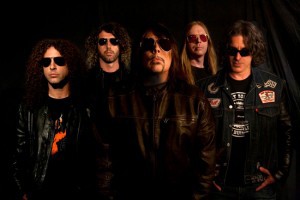
As a result, it seemed round about the time of ‘monolithic baby’ and ‘God says no’ that Monster Magnet did get kind of stripped down and riff orientated and now, with the more recent releases, Monster Magnet are happy to explore and just be interpreted however people want to…
Yeah – that’s definitely on purpose. As far as being a songwriter goes, I try different stuff and I love playing four minute rock song and I think I kind of hit the wall with ‘monolithic baby’ because what I was trying to do was to write straight up rock and roll which could be played easily live because we’re such a touring monster, but the lyrics would be very, very cynical and topical about the world and social stuff, and there’d be kind of a nod and a wink and the combination of those short, four minute rockers with traditional rock and roll chords and the satirical lyrics would be a thing of its own but it didn’t sell – people didn’t pick up on it or people picked up on it and didn’t like it. I was hoping that the lyrics and the combination would be so funny and ironic that it would be kind of a celebration of fist-in-the-air rock but with modern cynicism. But what happened, for whatever reason people didn’t dig on it. So, as usual with me, once I’ve tried one thing I usually move on to the next. It’s like “OK, I’m done with that…” and I did – I tried to move more into a psychedelic realm with ‘four way diablo’ and basically a work method and a music appreciation of older psychedelic weird things, so it’s kinda like a trip back into Monster Magnet’s past but at the same time it’s more song orientated than it ever was. It’s kinda mutating into a new thing at the moment. I can’t wait to write the next record and see what happens.
Having done all the live shows recently where you played whole records, have you ever thought about doing a full-on, old school concept record?
Yeah sure! I would love to do it. The trick with that stuff is actually making it good throughout. You know, sometimes the road to hell is paved with good intentions and you know a conceptual piece can turn out… Rick Wakeman’s ‘journey to the centre of the earth’ which could be a horrible nightmare you know, like “uh oh” I mean, there was a reason the seventies went away! Nothing against poor Rick, but you know things get over bloated.
I’ve noticed that when I write in a short time frame that the stuff is automatically somewhat conceptual just by the nature of where my head was at, at that time and even in the lyrics, the same stuff that was on my mind on a Tuesday is going to be on my mind on a Friday. And since I rarely write straight out fantasy…it sounds like I’m writing fantasy but really they’re just stories about me, that’s all they are, they’re autobiography but hidden in metaphors and analogies and all that kind of stuff… it’s a concept in itself. If I was going to be something else beyond that, it would be nicer to do it for a movie or something like that – that would be a cool way to do a concept album.
The big difficulty of concept albums, and albums in generally, is that there’s been a move away from listening to the whole and toward just listening to songs. Does it frustrate you that there will be people out there who just don’t get the whole idea of ‘the album’?
Nah, it doesn’t bother me. I’m totally aware of it and that’s been going for a really, really long time and in fact it may be on the upswing; that people appreciate listening to an album. A good album is kind of a story in itself and you want to get to the end. I don’t want to just read a chapter of a story. I miss the days when albums were treated more as a literary form – as an album being a thing, almost like a book, but it makes perfect sense that in this day and age that the masses… the mass listeners of the world really aren’t looking for music to do anything other than to make them feel good or to help them dance or reflect exactly what they’re thinking. It’s not like the sixties and seventies anymore where people are looking for a certain amount of insight or poetry in music. It seems like the masses now are more interested in getting on with their lives and they use music to support their feelings or to echo their feelings or just be a background music while they fuck around on their phone. It’s their loss. I mean that’s the modern age, and they’re like “there’s no poetry there. We don’t have time for poetry, poetry takes too long!” So it means that for people who write long form music, or who write collections of songs that go together, it means they’re just going to have to try harder to work together and show a place for like-minded people to go and it really is… in a way it’s kinda cool because there’s no money there and the people who do it are the people who are really into it. So there’s a strong chance that the quality, after going down in the music for like the last twenty years, will actually go up when you separate the people who are in it for the cash and the people who are in it for the music, for the art itself. So I have no illusions about selling what I do to the masses – it just ain’t going to happen. And for the long- form thing, let’s just say that I would count the mass market out for that, just count them completely out. There’s a couple of lost generations in the early twenty-first century who… they’ll look back in history and say “wow, those poor bastards just didn’t get a lot of cool stuff!” Or people will ask “what was cool about the twenty-first century?” and it’ll be like “well, it started with a bang and then the gear got really cool and then the art just kinda leaped out of its own ass and died!” that doesn’t mean that it’s not going to come back.
When I compared ‘milking the stars’ to ‘saucerful of secrets’ earlier it’s because the record is like a full-on journey…
Thank you very much dude!
So I was wondering how long it took for you to sequence the record because I remember an interview with Spock’s Beard where they were talking about the challenge of sequencing a record and I wondered if you found it to be difficult?
Sequencing is everything dude. It’s like wow, sequencing is rough. If you don’t have the material. If you don’t have the right thing for the right time, you come up with an album that sounds too long. It’s amazing – with the right sequencing, you can have an album that’s an hour long but doesn’t sound too long, but with the wrong sequencing five minutes sounds too long. I just had this problem with ‘milking the stars’ – not ‘milking the stars’ but ‘mastermind’ and the problem was that the material just wasn’t as good as ‘last patrol’ and I just started thinking I’d have to drop some songs because it just wouldn’t sequence right. So sequencing is everything and I try to pay attention to sequencing almost from the time I start writing. If I start on a writing binge I’ll write three songs in a week or something and automatically I’m thinking in my head about how they’d sound next to each other and then it constantly changes. And then you have to constantly update that and look at it again and revise the sequencing because some of the great… or seemingly great ideas that come out when I’m writing turn out to be shit ideas later. I’ve dogged down plenty of bad ideas you know like “this is going to be great!” and then I just wind up tossing it, like “well, that was a disaster!” Sequencing is also, and I’m sure you’ll have talked to bands about this, but it’s the last chance to make everything right with the world. Before you send the baby out, it’s like “OK! I have to button this button!” It’s like the last chance to really get it right.
You’re heading to the UK – how do you feel about talking and what do you expect these days from touring countries?
Touring is like the best. Some of the most fun I’ve had in my whole life has been that. It’s just a fantastic way to live and not everybody gets to do it. It’s exhausting and I can see people getting worn out, and I’ve definitely got worn out, but… let me put it like this: It’s like being in a circus with a lot of people and you’ve got a job to do, and that job is to be creative and make as many people happy as possible with what you do. It’s every night and every time you make a mistake and things don’t go right, you’ve got the next day to make up for it 100% It’s real time and I appreciate it more and more in a world that doesn’t seem to operate in real time, when you’re at home on your computer or whatever. This is as real as it gets. Get up, go! Lots of travelling and you meet all these people and every night is Saturday night! It’s a show and that’s your job – put on the show. Hopefully the shows are good. If the shows are bad and people are unhappy, that’s the worst thing, but most of the time in our case it’s been good. There’s a wondering mentality and when you’re travelling you’re not in any city for more than a day… sometimes I’m not even in the same city for more than fifteen hours… but it frees up a lot of your thinking. It takes you out of yourself and I’d recommend it to anyone to try at least once. At any time – just travel – it’s good for you and you get to meet people from all over the world and you get to find out why people are cool and you get to find out why a lot of the stereotypes about people are completely wrong and it makes you a better human. You see people all over. I love it. I just love the surprise and the superficial reasons for touring too… but I won’t go into them!
I just want to thank you – I’ve wanted to do an interview with you ever since I saw you… way back in 1999 when you played in Milton Keynes and you demolished The Big Day Out…
Oh man – that was the time we set the stage on fire…
That was the one where you set the stage on fire! I was eighteen when I saw that and that was just the most mind-blowing, rock show!
I haven’t thought about that in a long time; that was a GREAT day man! That was insane man, I almost got arrested; they were going to throw the book at me!
Well the people I was with, we still talk about that show even no man!
Wow, goddam, I’m so glad you reminded me of that. I remember being totally enraged. Back when I was young I used to go into these rages, like, “no-one’s going to remember us! We got stuck at the bottom of this bill, we were supposed to be right under Marilyn Manson blah, blah, blah!” and I was just hell-bent and I ordered my tour manager and road crew to go out and buy blankets and gasoline and they were like “do you really want to do this?!” and I was like “GO OUT THERE and buy blankets and gasoline and sheets and stuff and at the end of the stage we’re gonna set the stage on fire and it’s gonna look really cool!” But I didn’t know the whole fucking stage was going to go up! And it was roaring and it burned and I looked back and it looked like a plane had crashed onto the stage. There was just like this pillar of noxious smoke and I was like “oh shit, I’m in trouble now!” and the cops came for me, but the stage manager of Milton Keynes just told them to let me go and he didn’t press charges… God bless that man!
It certainly stuck in our memory and it stole the show man!
Well thanks dude!
And with that, one of the most interesting, funny, down-to-earth interviews I’ve ever been lucky enough to do for SonicAbuse drew to a close.
‘Milking the stars’ is out now via Napalm Records.
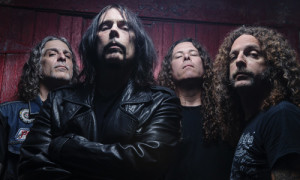
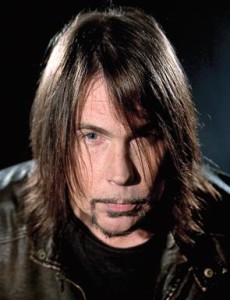
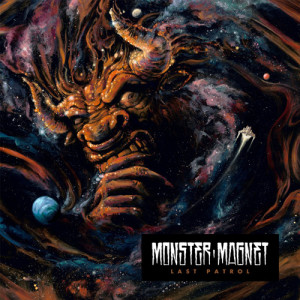
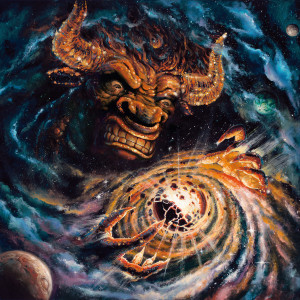
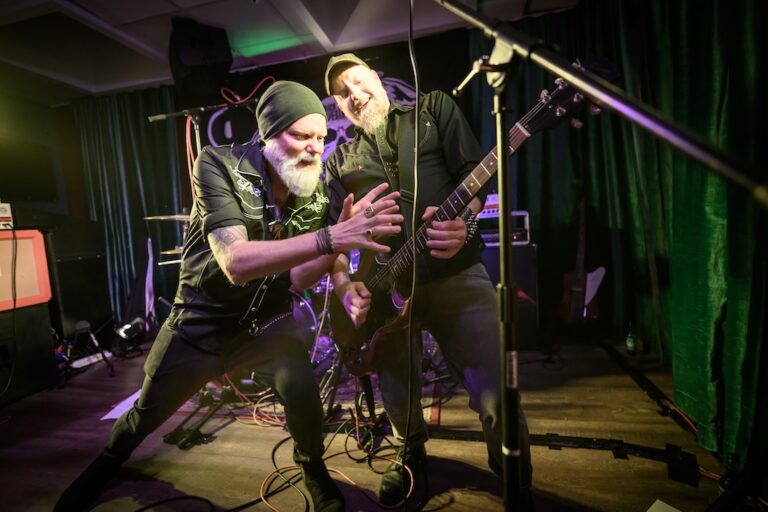



Great interview. thanks!
Thanks for reading, dude!